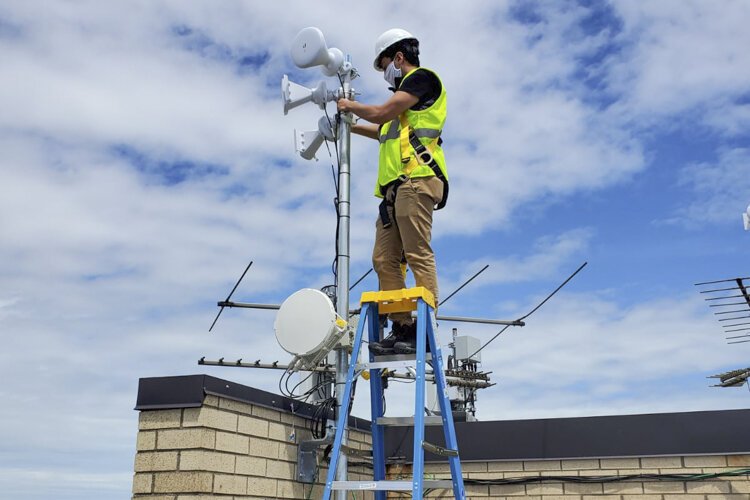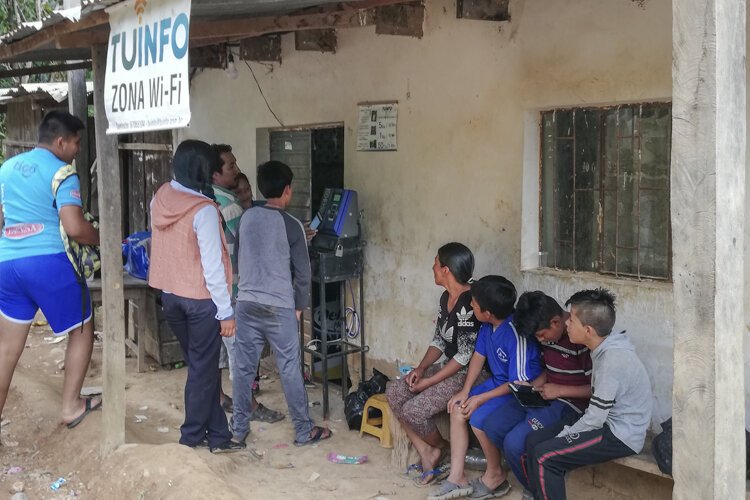Cleveland is the nation's least connected city. This Bolivian transplant wants to change that.
When it comes to bridging the digital divide, Rolando Alvarez knows one undeniable truth: It takes a whole village.
Before moving to Cleveland in 2019, Alvarez led the charge to help more than 5,000 people in his native Bolivia obtain much-needed Internet access. As the founder of TUINFO, Alvarez spent four years traveling to remote Bolivian villages to deploy self-sustaining Wi-Fi hotspots that would then be managed by members of the community.
“Almost none of the big [communications] companies were looking at how we could leverage the community to help the community,” says Alvarez. “I started a business model where I would go to remote villages, look for local champions, train them and make them our partners, and then they would basically receive a percentage of the income.”
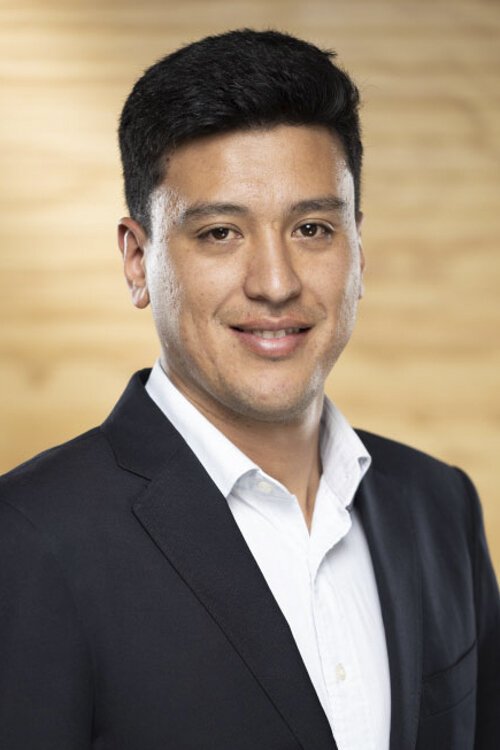 In 2018, Alvarez got the opportunity to broaden his impact when he received a fellowship from the Young Leaders of the Americas Initiative, which operates an exchange program for young entrepreneurs from Latin America, the Caribbean, and Canada and pairs them with U.S.-based businesses and organizations. When reviewing the opportunities for fellows, Alvarez’s eye was immediately drawn to the work of DigitalC, a nonprofit focused on furthering digital equity in Cleveland.
In 2018, Alvarez got the opportunity to broaden his impact when he received a fellowship from the Young Leaders of the Americas Initiative, which operates an exchange program for young entrepreneurs from Latin America, the Caribbean, and Canada and pairs them with U.S.-based businesses and organizations. When reviewing the opportunities for fellows, Alvarez’s eye was immediately drawn to the work of DigitalC, a nonprofit focused on furthering digital equity in Cleveland.
“There are so many communities I cannot serve as a for-profit organization [TUINFO], and I was interested in learning more about the nonprofit world,” shares Alvarez. “I was very intrigued by the work DigitalC was doing and amazed by how passionate everyone was about the mission.”
Alvarez was matched with DigitalC for what was supposed to be a one-month residency and ended up stretching into a long-term relationship. After the residency, Alvarez spent a year working remotely from Bolivia as a consultant for DigitalC, then moved to Cleveland in August 2019 to become DigitalC's Director of Technology. He also accepted an appointment as Case Western Reserve University as a research scholar.
His overarching goal? To replicate the success he’s had in Bolivia and apply it to EmpowerCLE, DigitalC’s effort to bring affordable high-speed Internet to 14 of Cleveland’s least connected neighborhoods including Fairfax, Hough, Clark-Fulton, Central, and Woodhill.
“One of the biggest challenges I see in both Cleveland and Bolivia is understanding the community; it’s important to spend time in the communities, listen to them, and really build a product or service that is a good fit,” says Alvarez. “We want to build trust in communities that have been left behind.”
Connecting the Dots
Alvarez knows firsthand what it’s like not to have Internet access—after all, he spent his childhood growing up in La Paz completely unconnected. “Even though La Paz is one of Bolivia’s biggest cities, we didn’t have Internet in the neighborhood I grew up in,” shares Alvarez.
After obtaining a bachelor's degree in electronic engineering from Escuela Militar de Ingenieria (EMI) and an MBA from Universidad de Santiago de Chile (USACH), Alvarez took a job with Bolivia’s biggest carrier, Entel S.A., in its planning department. During his six-year stint at Entel S.A., he was able to grant Internet access to his neighborhood of origin, which planted the seed for his future work with TUINFO.
“That was the first time I realized how much impact one person can make,” says Alvarez, “and when I started to think, ‘Hey, maybe I can do more.’”
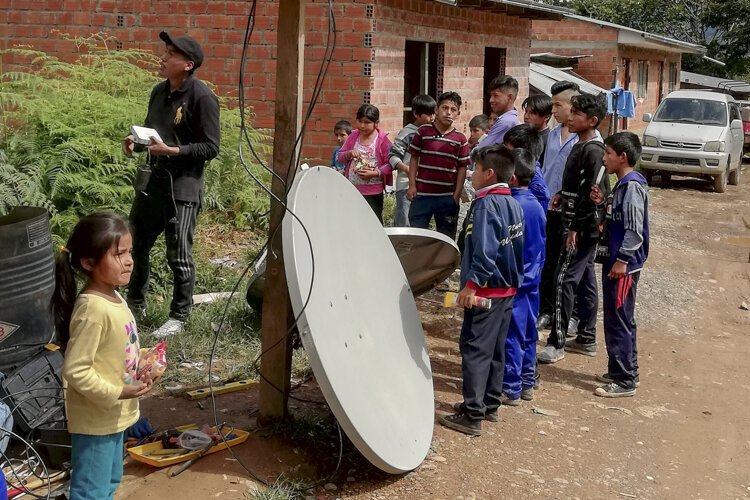 Alvarez struck out on his own in 2015 to found TUINFO, which has since grown to encompass 100 community partners and non-direct employees along with five full-time employees. For Alvarez, the most rewarding part has been seeing the immediate benefit of his work as residents of remote rural villages plug into the World Wide Web for the first time.
Alvarez struck out on his own in 2015 to found TUINFO, which has since grown to encompass 100 community partners and non-direct employees along with five full-time employees. For Alvarez, the most rewarding part has been seeing the immediate benefit of his work as residents of remote rural villages plug into the World Wide Web for the first time.
“The first thing they do is start doing video calls with their loved ones in other cities and countries,” says Alvarez, adding that most of the villages are at least 15 hours away from the nearest major city. “We also show them how it can help in their daily lives, whether that’s finding a YouTube video on how to change the tire or find a recipe that utilizes the vegetables they grow in their village. They have never engaged with this very basic stuff before.”
Alvarez is also proud of the way that his business model has empowered and created new jobs for Bolivians, adding that his first community partner to sign on now has more employees than TUINFO does. “We teach them about entrepreneurship and how to manage their finances, and it can really make an impact on the economics of these villages,” says Alvarez. “It’s amazing to see it growing and evolving.”
 Connecting the Unconnected
Connecting the Unconnected
Few Clevelanders would guess that our city shares many of the same challenges faced by remote Bolivian villages, but new census info confirms that Cleveland is the lowest-ranked big city in the U.S. for home broadband connections. In fact, 31% of Cleveland households had no home Internet access—including mobile data plans—as of 2019.
That’s where DigitalC comes in with EmpowerCLE, which seeks to provide high-speed connectivity by offering affordable Internet access for $18 a month (plus taxes) and free installation. The initiative first launched in Fairfax last September, when DigitalC placed an antenna atop the Juvenile Justice Center that now provides Internet access to 150 nearby households.
Since then, two more buildings have also been deployed in Fairfax, along with more buildings in other target neighborhoods, bringing the total to 400 paid households in Cleveland so far.
When the effort is complete, 14 Cleveland neighborhoods will be serviced by EmpowerCLE as part of a two-year plan to connect 27,000 households across Cleveland. According to Alvarez, the initiative was originally set to span five years, but the plan has been accelerated to accommodate additional challenges brought on by COVID-19.
“I wish we could accelerate it to three months,” Alvarez laments. “There are so many students that don’t have Internet access and need it.”
COVID-19 has also hampered DigitalC’s efforts toward community engagement around EmpowerCLE, with many events cancelled and plans to install a demo station at several locations (including the Fairfax Renaissance Development Corporation headquarters) halted.
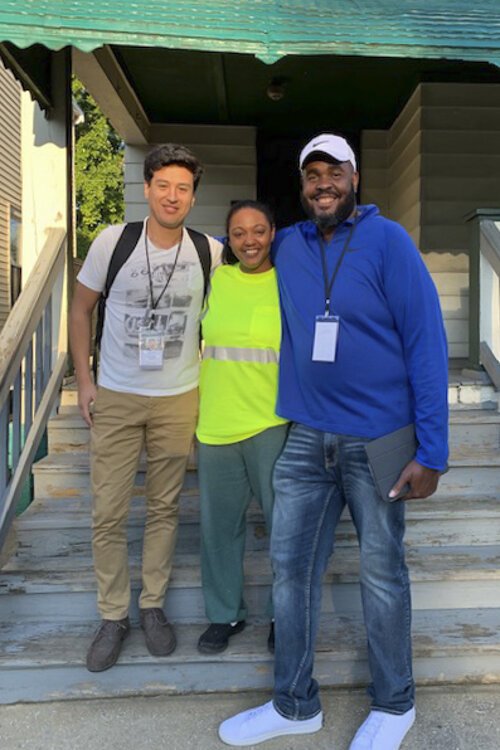 But Alvarez keeps his eye on the prize, visiting households individually to check in. “It’s important to have this engagement and interaction with customers,” says Alvarez. “I’ll pop up and say, ‘Hey, I’m the director of technology for DigitalC, and I’m just checking in to see how you are doing.’”
But Alvarez keeps his eye on the prize, visiting households individually to check in. “It’s important to have this engagement and interaction with customers,” says Alvarez. “I’ll pop up and say, ‘Hey, I’m the director of technology for DigitalC, and I’m just checking in to see how you are doing.’”
And Alvarez is willing to stay as long as it takes to see Cleveland find its digital footing. He resides with his wife, Noelia, and one-month-old infant, Matthew, in West Park, and now considers Cleveland a second home. As a TELCO engineer and certified project manager, Noelia is also involved with the EmpowerCLE initiative. Once the two-year plan is complete, the Alvarez family plans to relocate back to Bolivia, where Alvarez seeks to scale his TUINFO operation to other South American countries including Brazil and Colombia.
No matter where his future endeavors take him, Alvarez knows he has found his life’s work.
“I’m very passionate about the digital divide,” he says. “The Internet is basically a door to the knowledge of the world, and more than three billion people around the world don’t have it. Sometimes we think that these people are missing a lot of opportunities, which is right, but we don’t realize that we are missing out on so many talented people that should be included in this new digital economy. As I see it, connecting people to the Internet should be one of the most important things on the agenda of every leader around the world.”


